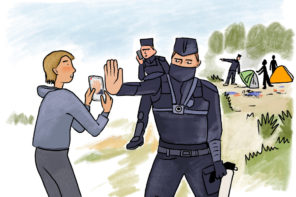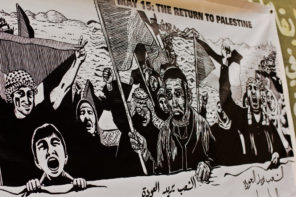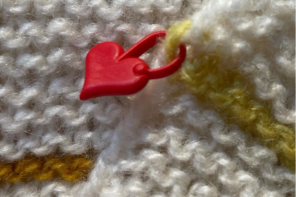Whatever you say, say nothing.
Seamas Heaney, 1975
On April 29th 2015 an eclectic group of scholars specialising in a range of disciplines gathered in Maynooth University to discuss the aftermath of Charlie Hebdo. Organised by Gavan Titley of Maynooth University’s media studies department the event “After Charlie Hebdo: complex media cultures and the limits of liberalism” constructed a fascinatingly varied picture of the responses towards Charlie Hebdo itself and its aftermath.
The event was divided into three sessions—an opening session with keynotes from Valérie Amiraux and Nicholas De Genova, a second session focusing on Charlie Hebdo ‘the local, national, global political event’ with speakers such as Carolina Sanchez Boe, Gholam Khiabany, Agnes Maillot, Farah Mokhtareizadeh, Aurélien Mondon and the final session 3 examining Charlie Hebdo as ‘the global media event,’ with speakers Des Freedman, Anne Mulhall, Angela Nagle and Toby Miller.
Herein, I give some sense of the debates and arguments which occurred across the day, whilst noting that in a blog of this length it is difficult to capture the full essence and argument of the speakers papers—but what I offer instead is some of the more interesting statements delivered in the various presentations. The event was also live tweeted from Allegra’s twitter account so readers can refer to that to further capture some of the droppings of debate occurring that afternoon.
Core to the conference was a deconstruction of the socio-political, cultural, and mediatized contexts informing Charlie Hebdo, the magazine, the event and subsequent (and myriad) responses to the event itself. Foremost amongst these analyses were critiques of notions of ‘freedom of speech,’ ‘secularism,’ ‘multiculturalism,’ ‘satire,’ and of course, ‘censorship.’ The event showed how the permutations and combinations of these overarching concepts are differently inhabited and engaged with by disciplines such as Media studies, English literature, Pyschoanalysis, Sociology, Cultural geography, Anthropology, French studies, Near and Middle East studies, Politics, and Philosophy.
As such then, the event anchored what are pressing and important questions in the collaborative ground between diverse disciplinary frames, thereby connecting different images of thinking regarding the Charlie Hebdo attack and its responses.
Producing such a rich tapestry of critical thinking is indeed no easy task in the face of the ever growing censorship of the neoliberal university. Such was the tone of the opening speech of this Hebdo event. Maynooth University’s Vice President for Research – Bernard Mahon opened the afternoon by flagging how important a duty (public) intellectuals and academics have to uncover the “patterns and meanings” of such events. In the neoliberal University where the Arts, Humanities and Social sciences are constantly being diminished – even eroded (for all kinds of reasons but particularly because they are not seen to be drivers of economic value), the words of the Vice President for research animated the importance of holding such events as this one.
Critical inquiry, understanding the many diverse ways of world making—thus bridging understandings and world-views—should be core to our teaching and writing as academics, regardless of whether we work in Business schools, Science and Technology departments or within the Arts, Humanities and Social Sciences.
This is the true value of the University and those who work within its walls, and Maynooth’s After Charlie Hebdo event evinced and demonstrated the edifying and productive nature of these kinds of academic encounters. Of course, as Maynooth’s Vice President for research pointed out, the occasions for nuanced and critical debate in the University are becoming increasingly more limited with the framing of censorship being driven and shaped by all sorts of gatekeepers of the research agenda – both within and external to the neoliberal University. Encouraged therefore by Bernard Mahon to “enact our duty to provide space to discuss the hard issues,” the After Charlie Hebdo event was opened in the grip of a thoughtful, reflective tempo, one arguing for a scholarly reckoning with the difficult questions that the world we live in presents us with daily.
With an abiding awareness of such debates and how they fit into the life of a University, Gavan Titley, the event organiser, was next to speak. Drawing the audience with alacrity into the world of Charlie Hebdo – the magazine, the attack, and the very many global responses to it, Gavan Titley’s introductory talk emphasized the ‘symbolic weight’ of the Charlie Hebdo attack “that condensed Charlie Hebdo into a singularity that could inter-alia be made stand for things it was not.” Quoting Rene Luz who says of Charlie Hebdo, “Each cartoon is seen to having been done by all of us. In the end, the symbolic weight is exactly what Charlie has always worked against: destroying symbols, breaking down taboos, bursting bubbles of fantasy. It’s wonderful that people are giving us their support but it’s going against Charlie’s cartoons,”
Titley highlighted how the ‘becoming symbolic’ of Charlie Hebdo through the global force-field of media attention was “mediated and condensed” by the Je Suis Charlie movement (both online and offline).
Titley showed how the request to become Je Suis Charlie proliferated in online and offline spaces, thus reproducing Charlie Hebdo as a mediated object (proving too complex to analyse in many respects).
Turning to a quote from Art Forum writer Kaelin Wilson who describes the response to Charlie Hebdo in terms akin to “a long spiritual, religious tradition of crisis writing. Perhaps that ever-expanding mass of storytelling, messy and oversensitive and argumentative as it may be, is truer to the experience of these events around the world, where reactions have been everywhere mixed, and nowhere the same, not even in the mind of a single person, to say nothing of the popular imagination of a single place,” Titley reminded the audience that an event such as Charlie Hebdo (which became a mediatized global event) takes place in different interpretive spaces and social environs thereby complicating our understanding of the event and its responses.
How such an event is forced to become somewhat legible through its various symbolisms was also drawn upon by Titley in his introduction, providing an important lens for the rest of the talks that afternoon – particularly resonant with Session 2: The Local, National, Global Political Event. The insertion of Charlie Hebdo into grand narratives such as the enlightenment, the clash of civilisations, race and multiculturalism and secularism has made of Charlie Hebdo, according to Titley (April 29th), “an intensive spectacle of identification and dis-identification, a prism refracting ideological difference.”
A key question within this is the manner in which secularism-laïcité has evolved into a moral value that erases difference and to some extent forces integration.
As the rest of the conference unfolded many of the papers did indeed, as Titley so insightfully anticipated, generate a sense of how this symbolic weight has been leveraged. Titley’s talk walked the audience through a variety of positions regarding 1. The magazine Charlie Hebdo, 2. The attack (event) and finally, 3. The response to the event. This movement signaled the diversity of views on the magazine and the event – from Charlie Hebdo as the child of 1968 (Jason Ferrago, Artforum), the inheritor of the enlightenment tradition to Charlie Hebdo, an irresponsible publication flirting with what could be conceived of as racially offensive imagery. In the rush to theorize how Charlie Hebdo ended up producing images that harmed and racialised Muslims, Titley (April 29th 2015) posits “innumerable bad answers have been given”. This particular conference, however, mapped the shared intelligibility of such an event across disparate disciplines and socio-political contexts.
Titley’s introduction also shared some insights into the ways in which Charlie Hebdo mediated a set of political antagonisms that have unfurled across a number of key moments in previous years. His analysis of the response to the event was particularly engaging-illuminating the endless plasticity in the social media response to the Charlie Hebdo event.
In being both reflective of and generative of the global response to Charlie Hebdo, the social media world witnessed and produced (and was in some respects saturated with) excessive affect and debate thus emphatically patterning the new world disorder (See Tariq Ali).

Titley’s introduction to the seminar therefore set out the multiplicity and diversity of viewpoints that emerged in the aftermath of Charlie Hebdo by stepping in and out of the world of print and social media and various academic debates – thus opening key questions regarding the perils of thinking with and through the Charlie Hebdo attack and its aftermath. The beginning of this seminar was thus set as hopeful in tone – with perhaps an implicit promise that some of what would be discussed would shift us away from the torrents of empty theorizing post Charlie Hebdo.
1. Opening Keynotes
The opening lectures consisted of papers by Valérie Amiraux of the Department of Sociology, University of Montreal, entitled “Gossiping and the Institutionalisation of Distrust: Public Conversations about Muslims in France after Charlie Hebdo” and Nicholas De Genova from the Department of Geography, King’s College, London,”The Whiteness of Innocence: The Metaphysics of Antiterrorism in Europe”.
Valérie Amiraux’s paper was an excellent paper with which to frame the event as a whole given its focus on how interpretations of Charlie Hebdo (and further Islam in France) are circulated in France. Opening with a reflection on nostalgia and the sentiments of loss and sorrow that persisted in the aftermath of the attacks, Amiraux (as an expat living in Canada) drew a poignant picture of her relationship to France whilst also stressing her sense of obligation, as it were, to view the many media reports of the Hebdo attack. Perhaps too at this juncture it is important to say that some of the more erudite and critical interpretations of Charlie Hebdo and its aftermath came from French expatriates.
Amiraux was careful to point out that these attacks did not of course take place in a vacuum – pointing to the long history of controversies regarding France’s Islamic population (in particular the debate regarding the wearing of the veil in public spaces – of which Amiraux has written about extensively).
Amiraux also brought a rich theoretical overview to her self-reflexivity in this paper by introducing a diagram which synthesized how she sees the ‘gossiping circuit’ in France with regards to the circulation of information regarding France’s Islamic population (see twitter stream for images of graphs). Key points made within this part of the discussion included how a mapping of public discussion regarding France’s Islamic communities shows how the nature of these discussions has changed since the late 1990s/early 2000s. Further, Amiraux pointed to the evolution of the notion of secularism (a recurrent theme in the conference) from a political and juridical organising principle to a narrative secularism, indeed as Titley had earlier pointed out, a core moral value.
It is French citizens who are asked to perform these values, with secularism becoming a norm for organizing social life, a request as such for a particular kind of integration.
Amiraux also introduced an analysis of the ‘public conversation pattern’ (see twitter feed for images) in which she looked at who was producing what kinds of discussions post Charlie Hebdo. Interesting points among this to note –is the quickness of response from other religious leaders in the aftermath of Hebdo, the very high volume of material generated by the extreme right on social media, and the ways in which these discussions served to reaffirm existing distrust of Muslims in France.
Amiraux concluded by pointing out that in some respects there is a missed opportunity within these spaces (in terms of engagement) where Islamophobia and anti-Semitism or general racism could be more forcefully tackled. Amiraux’s paper brought the personal, the theoretical and the political together with depth and passion-giving the audience much to think about regarding the evolution of trust and distrust, secularism as integration and of course, the role of gossiping and public conversation patterns in generating negative discourse on France’s Muslim population.
Next came Nicholas De Genova’s insightful paper which troubled the process of European decolonization in the context of the Hebdo attacks. Opening with the story of A boy named Charlie Brown (from the 1969 movie), De Genova drew an amusing yet enlightening parallel between Charlie Brown and the French (and European) process of decolonization. Charlie Brown is a boy deeply troubled about being a loser who travels off to the big city to represent his school at a spelling competition. However, Charlie loses the competition and returns to his home to find himself once again bullied by Lucy who reminds him of his place in the world whilst saying ‘welcome home Charlie Brown.’ Akin to a France and a Europe whose experience of decolonization has resulted in myriad complexities, De Genova’s use of the story of Charlie Brown provides with symbolic acuity some insight into how a France vexed by superiority (de Genova reminds us that France attributes the birth and evolution of many grand ideas to itself) has failed to fully understand the processes of decolonization as well as the movement and well-being of people from former French colonies.
De Genova’s reading of the Charlie Hebdo attack crafted a response to the event which understands the way in which Charlie Hebdo served “to institute a traumatic rupture in time that severed the events from any prior history and ensnared the nation as unwitting witnesses in a spectacular present.” The manhunt itself, indeed, De Genova (among others) argues, enshrouded Charlie Hebdo in a halo of sanctity. Like Gavan Titley’s introductory talk, De Genova also mapped out the insertion of Charlie Hebdo into particular ideological scripts and the subsequent shifts to a more deepened reinforcement of secular values in France, in particular in French classrooms.
However, as De Genova points out this reinforcement alongside the apotheosis of Charlie Hebdo as an icon of republican virtue has indeed descended into hysteria. Pointing to the questioning of an 8 year old boy in Nice concerning allegations of justifying terrorism as well as the imprisonment of others – De Genova drew on the writings of Houria Bouteldja and Malik to show that the general political climate in France today is one of enacting postcolonial racial tension, where as Bouteldja and Malik posit, “freedom of expression becomes a pretext for silencing those who have the least access to it.” This postcolonial racial tension is also visible in the Nique La France (Fuck France) (see lyrics) debacle (which predates the Charlie Hebdo attack) where singer song writers Saidou and Said Bouamama have been subject to attacks and legal proceedings by the right. De Genova points to these examples to highlight the re-entrenchment of a ‘clash of civilisations’ thesis as the dominant ideological frame operant in France (and indeed, elsewhere).
An abiding fear is also extant regarding the supposedly Muslim interest in ‘communitarianism’ – a politics of identity endangering to a secularism supporting a particular kind of integration. As such then, good Muslims are called upon to refute ‘Islamic terrorism’ and create a subterranean affinity with France’s secular republic under the guise of the dutiful Muslim and liberal subject.
De Genova concluded by stating:
The events of January 7th have bestowed a sentimental communion upon a (white) “nation,” emphatically disarticulated from the phantasmatic figure of “Muslim” “terrorism,” by endowing the whole atomized aggregate of alienated (“modern,” “secular”) individuals with the same name and the same emblem: Je suis Charlie. “Welcome home, Charlie Brown.” (De Genova, April 29th, 2015).
Both De Genova and Amiraux’s reading of the Charlie Hebdo attack and its aftermath gave expression and meaning to some of the key conceptual puzzles circulated in the public domain in France and elsewhere. The novelty of these presentations lay not in a firm break from other interpretations of the attack, but in a deepening and creation of new connections and thematics, thus offering the very nuanced and critical thinking that Maynooth’s Vice President for research had called for in the opening of the event. Attuned to the historical and contemporary debates on decolonization, the relationship of France to its Muslim communities, the history and evolution of secularism and integration, both papers challenged the audience to think with a fine-grained conceptual analysis of Hebdo and its aftermath.
Section 2: ‘The local, national, global political event’

Khiabany’s talk was one of the few presentations that developed an open conceptualization of racism in the context of Charlie Hebdo developing therefore important understandings into the workings of trust and mistrust as it is generated in the lifeworlds of some of Europe’s most vulnerable inhabitants.
This was followed by Agnes Maillot Salis Dublin City University paper ‘Deconstructing the Consensus: To be or Not To Be Charlie?’ which was a lively, engaging talk focusing in particular on the ‘Je Suis Charlie’ movement. Opening with a comment on the surplus of emotion generated by the Charlie Hebdo attacks, Maillot mapped out the evolution of the Je Suis Charlie movement in terms of its speed, commitment and visibility. Commenting on how quickly the Je Suis Charlie logo and iTunes app were designed in the aftermath of the Hebdo attack (one hour), Maillot pointed to how critically mobilizing individual and collective sadness post the attacks in France turned out to be. What was key in this talk was the mapping of the binary oppositions in who identified as Charlie (see map of where Je Suis Charlie was tweeted) and who did not (for example Les Indigenes de la Republique), and the implications that this had for discussions of freedom of speech and questions of secularism. Maillot pointed to the complexities within this identification process, showing that even in the case of France –support for the publication of the Charlie Hebdo cartoons was indeed not as unanimous as it first appeared (see French poll results).
Next Farrah Mokhtareizadeh from the Department of Near and Middle East Studies TCD talk entitled “Impossible Solidarities: Islam, Feminism and (Fortress) Europe’s Shifting Frontiers” which was a beautifully framed piece anchored in the first instance in the writings of James Baldwin and William Faulkner shifted us to reflect on the difficulties of questions of race and gender in the context of inhabiting Europe as an ‘other’. Central to Mokhtareizadeh’s argument is the understanding that Charlie Hebdo and subsequent responses could be deemed a ‘battle over symbols.’
The question of how Charlie Hebdo was represented in both the American and French media also figured in this talk with Mokhtareizadeh emphasising that in the French media some of the debate centred on the world’s inability to fully comprehend the French tradition of satire whilst the American press focused on the attacks as an assault on democracy.
Implicit in Mokhtareizadeh’s paper was the struggle with integration and belonging and this brought us neatly into the next paper which was a comparative engagement with these very questions in the context of France and Denmark.
Carolina Sanchez Boe’s paper “From Jyllands-Posten to Charlie Hebdo. Domesticating the Muhammed Cartoons’ brought fresh comparative analysis to bear on the history of Charlie Hebdo the magazine and the publication of the Muhammed Cartoons. This rich paper drew important parallels between the socio-political and cultural context of Denmark and France (which is of course quite different) in order to understand the links being made in both contexts between satire, humour, belonging and integration and the formation of a ‘we’ anchored in this very nexus. What is striking about Sanchez Boe’s research is in spite of important socio-political and historical distinctions between Denmark and France, the language of integration and belonging still permeated all justifications regarding the publication of such images (for more of Boe’s work on this see https://www.academia.edu/10219420/Integration_through_Instult).
The challenges of understanding how humour and democracy and its link to notions of integration and belonging connects to secularism debate brought us easily to the work of Aurélien Mondon from the Department of Politics, Bath University whose presentation ‘Islamophobia and the Secular Hypocrisy” was an illuminating talk which focused firstly on the history of laicite and how this has evolved into a laicite (secularism) which has become overly concerned with Islamic difference. Through various case studies and imagery, Mondon demonstrated the levels of hypocrisy behind many of the promulgations of secularism in contemporary France (for more of Mondon’s thinking on this see openDemocracy).
Session 3: The Global Media Event
The final section of the conference tied together nicely some of the key threads running through the previous sessions – in particular the role of the media in generating complex sets of alliances and misalliances regarding Charlie Hebdo and the notion of freedom of speech.
Des Freedman of Goldsmiths was the first to speak with a paper strikingly entitled ‘Who Pays for Free Speech?’ This presentation offered an insightful and energetic unpacking of how the press in Britain (in particular) responded to the attack.
Freedman pointed out the prevalence of a focus on the attacks as an assault on democracy and freedom of speech in the British press. In creating a sense of solidarity, the attack on Charlie Hebdo’s cartoonists is constructed – as such – as an attack on all journalists.
Freedman pointed to a number of operant features within this approach – a marginalisation of the broader political context, a persistent image of Islam as a backward religion, and the press as defenders of free speech (interesting given the British press’ recent tapping scandals). How satire is imagined in different kinds of media spaces was also dealt with in this talk – with the notion of satire seen to be evolving into a kind of hallmark of democracy, and ones commitment to such being measured by a willingness to offend as many people as possible (for more from Freedman see openDemocracy) and politically correct notions of freedom of speech playing a silencing role in our right to say what we want when we want. Freedman concluded succinctly that while freedom of speech is a helpful frame to understand what has been happening post Charlie Hebdo, it is in the same moment – an unreliable one.
The next presentation by Anne Mulhall of University College Dublin brought quite a novel and elegant reading of the Charlie Hebdo attacks and aftermath. In a paper entitled ‘ Respect No Proprieties: Satire, Authority, Discipline,’ Mulhall situated her interpretation of Charlie Hebdo in the pyschoanalytic tradition. This paper was a clever juxtaposition between psychoanalytic interpretations of Hebdo and the ways in Charlie Hebdo has been represented as an inheritor of the French enlightenment tradition, granted its place amongst a lineage of greats who wrote satirically – such as Moliere, Diderot and Voltaire. Mulhall argues that this positioning makes Charlie Hebdo co-extensive with the values of the French Republic. Hebdo is thus redrawn as part of the coat of arms in a long French tradition of writing and satire.
Mulhall quoted Al Jazeera writer Remi Price who describes Hebdo as being part of a tradition that reaches back to the cradles of human civilization – thus making up the very DNA of French literature. One of the questions posed here is – are we thus unable to read Charlie Hebdo directly given the intertwining histories of the French enlightenment and the tradition of political satire. Mulhall then examined this debate through the lens of the pyschoanalytic tradition, presenting the view that the nexus factor between Charlie Hebdo and this thinking is of course the notion of freedom of speech, and both are – in some ways – inheritors of the enlightenment tradition. Quoting Psychoanalysts such as Jacques Alain Miller and drawing out the exploitative nature of early colonial Psychiatry (through a reading of Fanon) and recent accusations of Islamophobia in Pyschoanalytic works – Mulhall presented a very interesting configuration in terms of how we might otherwise examine Charlie Hebdo, the magazine, the attack, and the aftermath.
Angela Nagle from Dublin City University brought us from psychoanalysis into the fast-moving world of social media in a paper entitled ‘Identity and the Political Compass: the Role of Naming and Misnaming Political Philosophies in the Social Media Flame War.’ This presentation was predominantly an analysis of the English speaking social media experience of the Charlie Hebdo attack. Using social media and British media sources for this study, Nagle presented a reading of the interpretive misunderstandings circulated in the tweetosphere and beyond where (predominantly) English speaking participants lacking knowledge on the background of Charlie Hebdo magazine, and the workings of French political satire and its legacy misread some of Charlie Hebdo’s work.
A crucial point made by Nagle was that the response to the Charlie Hebdo attacks did not follow a typical left-right divide. Further, Nagle found that there appeared to be a palpable desire to attach racist meanings to cartoons which were in fact critiques of right wing thinking.
One such example being the attribution of a cartoon by French-Algerian artist Ali Dilem which appeared to ridicule drowning migrants arriving in Europe to Charlie Hebdo, when it was in fact the work of a cartoonist attached to the newspaper Liberte who had just joined Charlie Hebdo as a new staff member.
The final speaker that day was Toby Miller of whose paper entitled ‘ I Hate to Quote Stanley Fish, But: ‘There’s no Such Thing as Free Speech and it’s a Good Thing Too’ was an excellent paper to finish on with its grounding in an attempt to deconstruct the myriad debate on the notion of free speech post Hebdo.
Key to Miller’s frame is the proposition that free speech is always and everywhere contingent – an important note on which to end this event given the diversity of research and views gleaned from the many representations and interpretations of the Charlie Hebdo attack.
Miller set out a number of key theoretical propositions relevant to understanding the trope of freedom of speech in the context of the Charlie Hebdo attacks thus tying together in an eloquent and erudite fashion some of the key debates running through the event that day.
Final Reflections
Putting all of these presentations together presents us with a number of reformulations of Charlie Hebdo the magazine, the attack and the response. An event like this often opens as many questions as it closes off, but dominant modes of thinking around the question of freedom of speech and secularism in France as a moral value persisted throughout the event. Questions from the audience pushed the speakers to reflect a little more on the role of whiteness and gender in these debates, and also asked for further debate around the question of whether Charlie Hebdo had the right to publish these images and what that might mean for questions of ethics, censorship and responsibility in journalism.
While some of the discussion unpacked the historical, even cultural constructions of satire as seen from within and outside of France, I would have liked to have seen some further debunking of the ways in which the concept of satire has been manipulated into an example of one expression of democracy.
Satire is of course an example of the freedom to articulate inequality – as the saying goes its role should be ‘to comfort the afflicted and to afflict the comfortable’. In that role, the Charlie Hebdo cartoons, it can be argued, failed – as some of the speakers did indeed show. If satire involves a duty of care, the responsibility to question those in power rather than those who are already at the margins, then Charlie Hebdo did not uphold such values. However, others might argue that satire is anchored in a freedom cum laude-dissociated from the rules of responsibility and therefore, empowered by its existence outside of normative values – having no stake in the sacred, thus giving Charlie Hebdo every right to critique, mock and deride[1].
While the event offered strenuous and reflective evaluation of how secularism in France has evolved into a moral value, a form which erases difference and asks for a certain kind of integration – had time permitted – some debate around the post-secular would have been valuable. This event then comprised of a group of academics wrestling with the very particular challenges of thinking through the Charlie Hebdo event – who in so doing brought together the fragments of distinct disciplinary work on conceptual issues thick with distress post Hebdo.
While many questions will remain open, the presentations in this event give hope that the potential for further discussion and development of these issues will remain a burning concern for academics across divergent disciplines thereby emphasizing the importance of how critical understandings of events such as the Charlie Hebdo attack provide a crucial grammar of interpretation for the increasingly complex world we all inhabit.
[1] I owe credit to my colleague Dr. Keith Egan of NUI Galway for discussing the notion of satire and freedom of speech with me.












